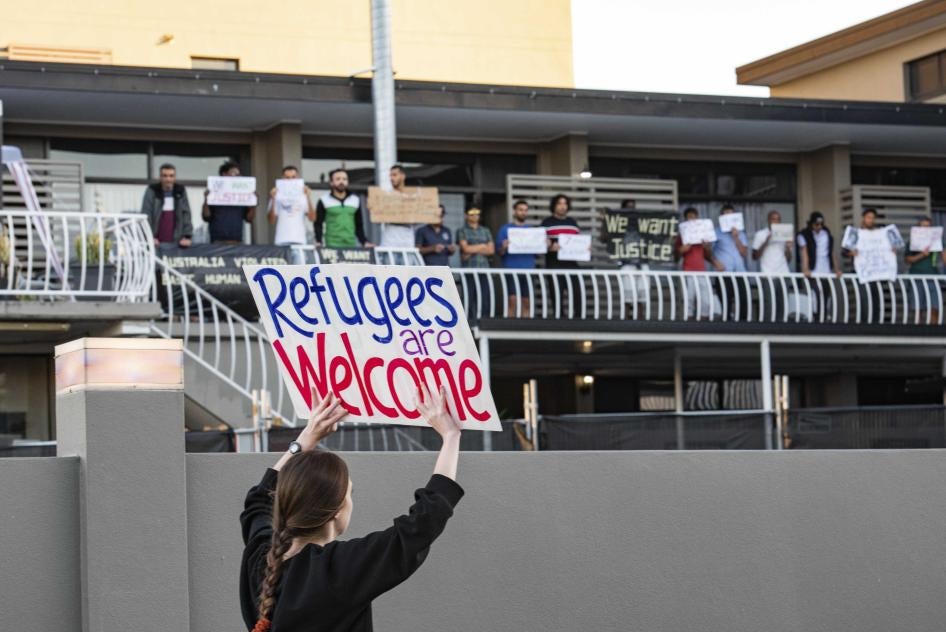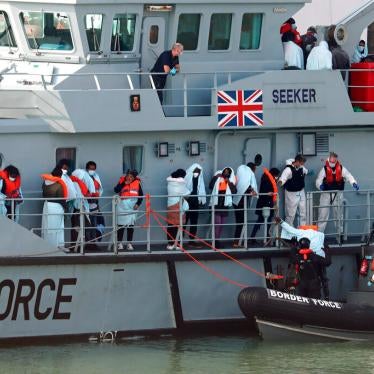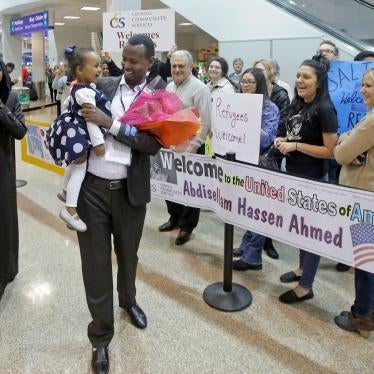(Sydney) – Other governments should reject Australia’s abusive and costly offshore processing of refugees and asylum seekers, Human Rights Watch said today. July 19, 2021 is the eighth anniversary of the Australian government’s resumption of its offshore processing policy, which has harmed thousands of people.
Denmark has passed legislation allowing the transfer of asylum seekers to offshore locations, and the United Kingdom is considering such a policy.
“Australia’s abusive offshore processing policy has caused immeasurable suffering for thousands of vulnerable asylum seekers,” said Sophie McNeill, Australia researcher at Human Rights Watch. “The cruelty of these camps, in which seven people have committed suicide and children have been terribly traumatized, should not be replicated elsewhere.”
Since July 19, 2013, the Australian government has forcibly transferred more than 3,000 asylum seekers who sought to reach Australia by boat to offshore processing camps in Papua New Guinea and Nauru. Individuals and families with children spent years living in substandard conditions in these centers, where they suffered severe abuse, inhumane treatment, and medical neglect.
Under international law, immigration detention should not be used as punishment, but rather should be an exceptional measure of last resort to carry out a legitimate aim. Adult migrants should be detained for the shortest time necessary. Children should not be placed in immigration detention.
Offshore processing not only inflicts human suffering, but is also costly. It is estimated that offshore processing cost the Australian government A$8.3 billion (US$6.2 billion) between 2014 and 2020. The annual cost of detaining a single asylum seeker in Papua New Guinea or Nauru is A$3.4 million (US$2.5 million).
Refugees and asylum seekers who have been transferred to Australia for medical treatment remain in limbo, with no permanent visas and little support, under threat of being returned to Papua New Guinea or Nauru at any time. At least 169 refugees transferred under the repealed Medevac legislation remain in Australia. Some refugees and asylum seekers are being held in Australia under guard in hotels, in makeshift detention centers referred to as “alternative places of detention.”
Approximately 962 people have been resettled to the United States, under an Australia-US resettlement deal. More than 230 people remain in Papua New Guinea and Nauru.
“Other countries should learn from these horrors, rather than repeating them,” McNeill said. “The Australian government should accept New Zealand’s repeated offers to take some of the refugees, and work toward ending offshore processing once and for all.”
For selected accounts, please see below.
Selected accounts:
Thanush Selvarasa, a 31-year-old Tamil asylum seeker from Sri Lanka. He spent eight years in detention, six and a half years offshore, and one and a half years in hotel detention in Australia:
Offshore processing centers destroyed our lives. We are the victims of this cruel policy. Many of our friends lost their lives because of this cruelty. I myself tried to kill myself twice. Human beings have the right to seek safety and protection. This kind of indefinite detention really causes pain. It’s like cutting your neck. It’s so painful, no one should do it again to people. We are the examples from Australia who are affected by this policy. Still, I only have a temporary visa and can’t live. I’m the same human being as anyone, why am I treated like this? I don’t know how to explain this feeling.
Abbas Maghames, a 34-year-old Arab Iranian asylum seeker. He and his family spent six years in offshore detention on Nauru and he currently remains in immigration detention in a hotel in Darwin:
Please. We need to get out from detention. It’s been almost nine years I’ve been in limbo. Everyday I’m suffering. My mental health is getting so worse. This is not a correct solution. Australia doesn’t treat me like a human. It’s not right to treat anyone like this. Every night I have nightmares. We live with stress and depression every single day. We are so suffering. We are so tired.
Loghman Sawari, a 25-year-old Ahwazi refugee who left Iran and came to Australia a few days after the resumption of offshore processing on July 19, 2013. He has spent eight years in detention, six years in Papua New Guinea, and two years in detention in Australia:
It’s very hard when some country accepts you as a refugee, and you’re still locked up. … Before I came [to Australia under Medevac], I was in the ICU, in Papua New Guinea. And I was in the hospital for two to three months, suffering from mental health and physical. And then the minister [for Home Affairs] signed for me to come and get treatment. But since two years I have been in detention I did not receive treatment. … We’re looking for safety, and we’re looking for a safe place to resettle. We need some place to call it home.









